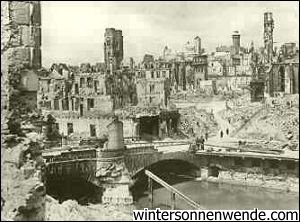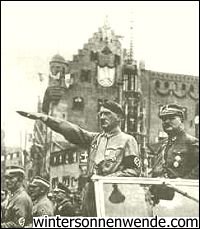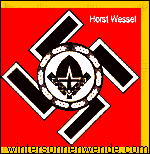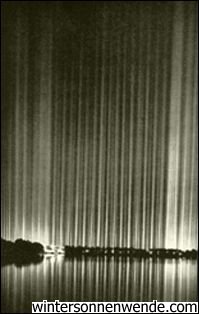  |
The Nazi Rallys at Nuremberg
Once a year, early in September, all eyes in Germany are turned to Nuremberg.
The world at large takes an ever greater interest in this city as the years go by. It is
here where the National Socialist Party holds its annual rallys. These are
gatherings entirely different to similar events in the parliamentary democracies.
The difference is not only to be found in the huge assemblies of the SA and SS
men, the corps of political leaders, the Hitler Youth and the Labour Service but,
at each gathering, the Führer lays down his programme of work for the
coming year. The names given to these annual rallys are also characteristic. "The
Victory of Faith", the "Triumph of Will", were the first two after the assumption
of power. Early this year, the Führer had already assigned the title of "Rally
of Peace" to the 1939 gathering.
I will endeavour to describe the impressions gained when in September 1937 I
was given the opportunity of attending that rally.
As I sped towards the old city of Nuremberg, I tried to remember it as I had seen
it many years ago, a perfect specimen of mediaeval Germany surrounded by its
old walls and towers. How would the venerable city take to playing its part as the

Scriptorium comments: no, the desecration of
Nuremberg was the work of the glorious Allied victors! By the end of the war, 90% of the old
city was in ruins.
[Stadtarchiv Nürnberg]
|
Mecca of the new revolution that was transforming Germany? Of one thing I was
sure, that the German people under their new leader, with his sense of the artistic
and his love of everything German, would not have done anything to desecrate
this priceless treasure from the past.
There is a new Nuremberg, for Nuremberg is today, as it was in the middle ages,
an important manufacturing centre; but it lies outside the city walls, and not even
the railway has been allowed to enter and to spoil the old town. On leaving the
station, the old walls are facing you looking like an illustration from Grimm's
fairy tales. On the day of my arrival the battlements were decorated with the long
red banners with a white disc and the black swastika in the centre, which Hitler
designed for his party and which is now the flag of Germany. Beautiful in colour,
the long banners draped the old grey walls, in perfect harmony, and they seemed
pleased with this new decoration. It was of good omen, that the new revolution
was so closely knit with the past of the German people and was not a garish and
vulgar twentieth century invention. Hitler had not only chosen Nuremberg as the
Mecca of the Nazi party because its people had been faithful to him in the early
days of the movement, but also because he wanted to associate the revolution
indelibly in the German mind with the past.
Walking through the streets of Nuremberg I saw only two varieties of decoration.
The green branches of the pine, and the long red banners hung everywhere. Those
who saw the decoration of Bond Street at the time of the Coronation will get
some idea of the general effect.
The streets were crowded with people, and with the men of the S.A. in their
brown uniforms, and the S.S. in their black uniforms, who had special charge of
the crowd. No soldiers and hardly any police were visible anywhere. I was
amused to read in an English newspaper from their special correspondent at
Nuremberg that the streets were swarming with soldiers.
It so happened that I was so fortunate as to step out of the station just when the
Führer was expected to pass by on his arrival. Both sides of the street were
lined with a jolly crowd joking and laughing with the S.S. men in their black
uniform, to whom had been given the task of holding them back. They stood
about a yard apart with a leather band held between them to form the barrier, and
with no weapon of any kind except a small dagger. There could be no question
that it was a joyous crowd looking well fed. One day I mentioned to a working
woman in this country that under the Nazi regime the German people were only
allowed a quarter of a pound of butter a week each. She stared at me in
astonishment and said "I have not eaten butter for years, I cannot afford it".
Presently as I stood waiting, some open cars went by containing Nazi officials
who were duly cheered. Then there was a long pause which was broken by the
passage of a motor bicycle belonging to the police, with a yellow flag which
passed by to see that the road was clear, and then we heard the roar of "Heils!" in
the distance coming nearer and nearer. The excitement of the crowd was
infectious, at last I was to see the Führer, the man who held Germany in the
hollow of his hand and commanded respect in Europe. His solitary open car

Scene from the 1933 Parteitag rally.
Stadtbibliothek Nürnberg]
|
moving at about six miles an hour, accompanied with no escort, was approaching.
Standing in the car beside the driver was a slim erect figure in brown uniform,
with one hand resting on the windscreen and the other arm held out in the Nazi
salute. He looked straight in front, his face serious and composed. We are
accustomed in our processions to the smiles and bows of Royalty, but I imagine
the immovable erect figure is derived from the tradition of the old Roman
Generals when receiving a triumph.
I had read in our newspapers that Hitler never dared to move outside unless he
was surrounded by an armed guard. Not only was he alone, but the S.S. men
lining the street had no weapon to protect him.
But what of Hitler himself? I saw him many times afterwards talking with the
officers of the S.S. and S.A. and speaking in the stadium, and tried to compare
him with other great men I have seen in my life, men of strong personality as all
such men must be. No man cares less for the display of power. When he received
the march past of the S.A. and S.S. men in the old market square, he was dressed
in a brown shirt, riding breeches and black riding boots without hat or coat. We
are used to a display of gorgeousness on the part of generals riding on a charger
wearing a magnificent uniform and covered with medals. Hitler's uniform did not
differ from that worn by his S.A. men, and his only decoration was the decoration
for
valour - the Iron Cross of the First Class. It seemed inconceivable that this man in
the brown shirt talking with his officers was the master of Germany.
His face is familiar to all of us from his photographs but they do not do him
justice. I have never seen one that I liked; he eludes the camera which does not
register what is most of interest in his face and expression. He is different to any
man I have ever seen before. A flame seems to burn within that slim figure and to
look out of his eyes. There is nothing of the fanatic in his expression, but a look
of superhuman energy and intensity of purpose; the face of a man specially
endowed with the capacity for power; his very simplicity and absence of
ostentation strengthens the impression. Bonaparte for all his genius was a vulgar
soul and clothed himself in Imperial robes and troubled himself about the details
and the etiquette of a court. Such trivialities are impossible for Hitler. Studying
his face we can understand those quick decisions which have astonished his
followers and electrified Europe; decisions carried out with a surprising rapidity
and efficiency. Like Bonaparte he is always in advance of other people and
therefore takes them by surprise. Bonaparte had a habit much disliked by the
opposing generals of arriving with his army twenty four hours before it was
possible for the army to be there; if Hitler had the vulgar ambition for military
conquest, he would be the most dangerous man in
Europe to-day, because he would outmanoeuvre the generals, just as he has
outmanoeuvred the diplomatists by the simplicity and directness of his approach
to all questions; but he belongs to a new age in which such conquests are an
anachronism, though the diplomatists of Europe living still in the past have not
yet realised that fact, and therefore pile up armaments which compel Germany to
do the same
in self-defence.
I have not yet begun to tell what I saw in Nuremberg and the impression it made
upon me, but in truth there is only one man in Nuremberg amid all these
crowds - the Führer.
Everywhere one met with friendly faces and a charming welcome. The Germans
are probably the only people in Europe who really like us, and admire us probably
much more than we deserve. It is because of that very liking that when irritated
by the attacks in our press, and by our public men, they at last turn on us and give
us some of our own back again. Attlee speaking in the House of Commons calls
Hitler a gangster, and a German newspaper accuses Baldwin of bawling like a
street urchin. It is all very childish and stupid. As I have said, they like and
admire us, and I defy anyone not to like them. We feel at home with them as we
can never feel with a Frenchman or an Italian. I myself am a Scotsman, and it is
perhaps truer to say that the Scotsman and the German always get on well
together.
The three things which impressed me most during my stay in Nuremberg were the
torchlight procession, winding through the streets, the long red banners glowing
in the light from the torches; the meeting of the Politische Leiter in the great
stadium at night; and the parade of the boys of the labour camps.
This is the part of the Nazi organisation which has attracted most attention in this
country. Started on a voluntary basis before Hitler came into power, he at once
realised its importance in training the youth of Germany to the idea of citizenship
taught by the Nazi party, and its significance as symbolising the whole Nazi
conception of the State.
At about 19 years of age every boy in Germany, whether he be rich or poor,
"Cook's son, Duke's son, Son of a belted Earl", spends six months in a Labour
camp with spade and pick reclaiming the waste soil of Germany to make it fit for
cultivation, draining the land, improving the forests, planting trees, and doing all
that is needed to develop the natural resources of Germany. They all live and
work together, and so that there shall be no distinction between rich and poor,
they are all limited to the same amount of pocket money, and like the English
school boy the hamper from home is shared with everybody.
The fundamental ideas of National Socialism are all expressed in this
organisation. The dignity of Labour, even of the roughest kind, if undertaken in
the service of the Reich; the wiping out of the distinction between the bourgeoisie
and the workman; and the union of the German people as members one with
another. Incidentally it is giving Germany the most physically fit youth in the
world.
Every year contingents are sent from every part of Germany to be received by
Hitler in the great stadium at Nuremberg; they are all in a uniform of their own

RAD banner, in this case from the
contingent "Horst Wessel".
|
with their knapsacks on their backs, and shouldering a brightly polished spade
instead of a rifle. Each contingent has its own band and carries its
own banners, the swastika banner, having on it a spade surrounded by a wreath of
corn [actually, wheat; Scriptorium]. The stadium was
packed with people when Hitler arrived; then we heard the
music of the band of the first contingent and as they marched we all rose and
saluted the flag. On passing Hitler they broke into the goose step, and then turning
to the left, the spades flashing in the sun like mirrors, came in from the back of
the stadium and formed up placing their knapsacks on the ground and seating
themselves upon them. Contingent followed contingent, until the vast floor of the
stadium was filled, then standing up they went through the military salute with
the spade instead of the rifle, and stood at ease with both hands resting on the
handle of the spade. All these movements were carried out by each section at the
word of command with military precision; as the one hand came down upon the
other on the spade handle, it rang out as one clap. The neatness with which they
performed all these movements was repeatedly applauded by the audience, whose
enthusiasm and interest in the boys made me think of a collection of British
parents at a school cricket match. The uniforms, the bands, the banners, and the
absolute precision of movement on word of command are all intended to show
that the glamour which surrounds preparations for war can equally well surround
service in the cause of peace. Before dispersing the boys chanted a litany of
dedication to the Reich, and in memory of the dead of the great war, written by
themselves. Hitler in his speech said that this was the greatest demonstration for
peace which the world had ever seen. When he said "Ein Volk, Ein Reich,
Eine Gemeinschaft, Eine Kraft", the whole audience rose and thundered
applause.
Later in the day I saw some of these boys, brown and sturdy, marching back to
camp, singing as they went. The streets were lined with people laughing, cheering
and throwing flowers and packets of sweets. As I watched them I could not help
thinking of
the pale-faced, underfed and underdeveloped boy in our great cities, loafing at a
street comer with a fag in his mouth. These German boys, though doubtless full
of fun on occasions, have serious faces, inspired by an ideal of service to their
fatherland, and ready if necessary to die in her defence. The Führer is their
hero.
My last vivid memory is of what took place at the meeting at night in the stadium
when Hitler addressed the Politische Leiter. We were sitting in darkness, when

"Cathedral of Light" over the grandstand,
Zeppelin Field, Nuremberg 1937
|
suddenly shafts of light shot up all round the stadium, meeting over our heads and
forming a temple of luminous pillars symbolising the Reich. Then a soft light fell
on the back of the stadium, and we saw, rising into sight, descending the steps,
and moving slowly between the ranks massed on the ground, men carrying the
long red Nazi banners, the spear points of the poles glancing in the light. Very
slowly they moved towards the front of the stadium, symbolising the flow of the
life stream of the German people, the audience observing an absolute silence.
When they had come to rest, we all rose and sang Deutschland über
Alles and the Horst Wessel song. Then the trumpets sounded and
Hitler began his speech.
In one part of the stadium was a tragic little group, Austrians, exiled from their
land because of their political beliefs, who greeted Hitler with cries of
"Österreich grüßt den Führer''. One day standing
in the street, I found myself next to an Austrian lady. Among the laughing crowds
she was silent, her eyes filled with tears. She turned to me and said in English, "I
have never seen the Führer
before - I think my heart is breaking".
   The Case for Germany
The Case for Germany
A Study of Modern Germany
|
|